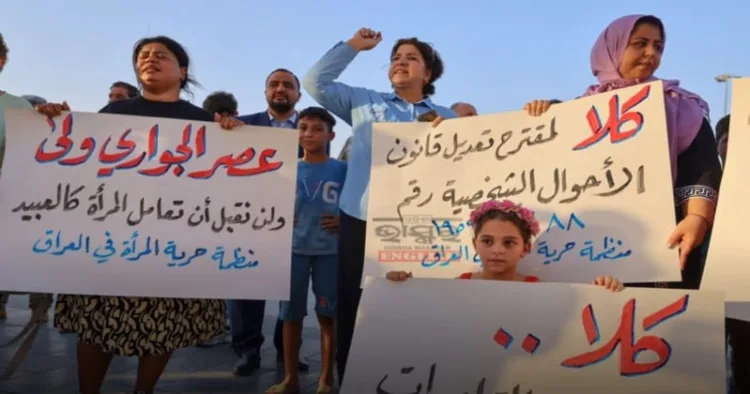Shia Islamist parties in Iraq are advocating for an amendment to the country’s law in Parliament that would permit girls as young as nine to be married. While 117 countries, including the United States, allow child marriage, it is a significant issue in Africa, with Niger having the highest rate of child marriage among girls, followed by the Central African Republic, Chad, and Mali. The proposed amendment, which had its first reading on August 4, caused outrage among women and child’s rights activists.
Amendments to Law 188 of the 1959 Personal Status Law are being considered. This law was enacted by the Abdul-Karim Qasim government, led by a leftist nationalist who introduced several progressive reforms, including improvements in women’s rights. The law is considered the most comprehensive in West Asia regarding protecting women’s rights.
Passed by specialists, lawyers, religious leaders, and experts in 1959, it is considered “one of the best laws in the Middle East,” according to women’s rights activist Suhalia Al Assam. The law establishes 18 as the legal marriage age for both men and women and places restrictions on men taking a second wife. It also allows a Muslim man to marry a non-Muslim woman without any conditions.
However, the law permits men and women to marry at age 15 with the approval of a judge and their legal guardian. It also allows a woman to challenge her husband if he fails to provide a home for her or care for her when she is ill. The proposed changes to the law are being pushed by the Coordination Framework, a coalition of conservative Shia Islamist parties that holds the largest bloc in Iraq’s Parliament.
Key Points and Reactions to Iraq’s Proposed Personal Status Law Amendments
The draft bill requires couples to choose between the Sunni or Shia sect for “all matters of personal status.” The draft bill states, “When a dispute occurs between the spouses regarding the doctrine according to whose provisions the marriage contract was concluded, the contract is deemed to have been concluded by the husband’s doctrine unless evidence exists to the contrary.”
The change would let “the offices of the Shiite and Sunni endowments” to sanctify marriages instead of the courts.
The draft bill requires Shia and Sunni endowments to submit a “code of legal rulings” to Iraq’s Parliament within six months of the amendments being ratified.
The Shia code would be grounded on “Jaafari jurisprudence.” Jafaari law, named after the sixth Shiite Imam Ja’afar Al Sadiq, governs marriage, divorce, inheritance and adoption. It permits girls as young as nine and boys as young as fifteen to marry.
Independent MP Raed al-Maliki introduced the draft bill. Raed had previously proposed amendments to the anti-prostitution law that criminalised homosexuality and sex-reassignment surgeries.
Previous versions of the draft bill have suggested banning Muslim men from marrying non-Muslim women, legalising marital rape, and preventing women from leaving the home without their husbands’ permission. These proposed changes have sparked strong criticism from activists.
Tamara Amir, CEO of the Iraqi Women’s Rights Platform, said, “These proposed changes to the Personal Status law would severely harm the rights and well-being of women and children in Iraq.” She added, “The Iraqi community firmly rejects these proposals. They are degrading step for both Iraqi men and women and go against everything we’ve been fighting against for years.”
The President of the Organisation of Women’s Freedom in Iraq (OWFI),Yanar Mohammed, stated that the coalition was trying to distract from its own failures, including “massive corruption.”
“They are using this legislation to divert attention by terrorising Iraqi women and civil society. This law would revoke the modern rights women have achieved and impose outdated Islamic sharia, treating women as mere objects for pleasure and reproduction, rather than recognising their fundamental human rights,” she said.
Iraqi women lawmakers are forming their own coalition to oppose the amendment.
“The group wants to emphasise that their opposition is grounded in legal, religious, professional, and social considerations, rather than emotions or external influences. They are focused on protecting the order of the Iraqi family,” said Iraqi MP Noor Nafea al-Julihawi.
“The proposed change to the Personal Status Law fits with the constitution, which allows Iraqis to make their own choices as long as they does not contradict the constants of Sharia and the foundations of democracy,” said the Shiite bloc in a statement.
Where is Child Marriage Permitted?
Around 117 nations, including the United States, allow children to marry. The United Nations Population Fund reports that child marriage continues to be a significant issue. It states that worldwide, one in five girls is either married or in an informal union before reaching the age of 18.
The issue is especially severe in the least developed countries, where 36 per cent of girls are married before they turn 18, and 10 per cent are married before the age of 15. The issue is widespread it African countries are particularly afflicted.
Niger has the highest rate of child marriage, with over 75 per cent of girls under 18 married, and about 30 per cent of them are younger than 15.
Niger is followed by the Central African Republic, Chad, and Mali. In Niger and Chad, the legal marriage age is 15 for girls and 18 for boys, while in Guinea, it is 17 for girls and 18 for boys.



















Comments